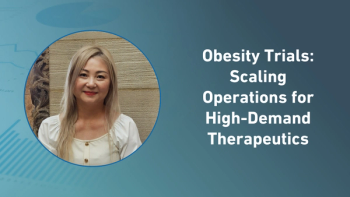
TransCelerate’s Comparator Network: Terry Walsh of GSK Discusses Sharing Materials for Comparative Trials
Issues of counterfeit drugs being introduced into a supply chain have been a concern in comparative clinical trials. Terry Walsh of GSK speaks about the addressing this issue and ensuring that comparator drug supplies are more readily available for comparative trials.
The biopharmaceutical industry oftentimes conducts comparative clinical trials, where one group of patients receives a comparator drug and another group receives the sponsor company’s investigational product. However, comparator drug supply can be scarce, oftentimes directly delaying study timelines, and potentially allowing the introduction of counterfeit drugs into the supply chain. This risks patient safety and clinical trial efficacy outcomes, and creates misconceptions between biopharmaceutical enterprises.
Terry Walsh, Head of Global Externalization Packaging, Labeling Distribution and Comparator Drug Access at GSK, will discuss how TransCelerate’s Comparator Network has helped to address those issues by strengthening relationships between biopharmaceutical enterprises, and ensuring that comparator drug supply is available for comparative clinical trials.
Moe Alsumidaie: What industry issues drove TransCelerate to focus on creating a Comparator Network?
Terry Walsh: There are a lot of concerns from stakeholders when preparing and conducting comparative clinical trials. Some pressures derive from misconceptions; Biopharmaceutical companies tend to be hesitant about supplying comparator drug because there is a misconception that if we compare drugs head to head, the aim is to show how one drug is better than another, but, the reality is that many of these studies are demonstrating the benefits of a combination drug therapy when the therapeutic response with a monotherapy is not as expected. This can also help put both drugs at a competitive advantage in the eyes of payers.
Other challenges are operational in nature, which involves storing, securing and maintaining comparator drug supply throughout the study. For example, if a study needs 10,000 units, and we are resupplying on a quarterly basis without any certainty of resupply, the worst-case scenario is not having sufficient supply when the study is in its midst, which not only stops the study in its tracks, but, could also potentially lead to other concerns, as patients are unable to continue taking medical product as instructed in the trial protocol, leaving them without a potentially life changing drug.
Another risk is geography, especially as it relates to import and export documentation, approvals and quality releases. When we go global, we also run into logistical issues, such as temperature excursions for factors which are beyond our influence. For instance, if the drug is left on the tarmac in Arizona, in the middle of June and it's 120° outside, no matter how equipped your shipping containers are, the temperature is going to start impacting the integrity of the comparator drug. We are addressing these issues with TransCelerate’s Comparator Network by sharing product specific documentation.
MA: How are Sponsors currently verifying whether drugs are original or counterfeit?TW: At GSK, we have rigid supply chain standard operating procedures thorough feasibility procedures with vendors, and documentation practices to prevent counterfeit supply from entering the chain and to ensure that we track comparator drug from the site of manufacturing all the way through to the loading dock, and then to the patient. This documentation is important, especially when customs or regulatory agents in some countries need to see proof of the entire cycle. But to get this kind of documentation from other biopharmaceutical companies is difficult, as we must go through third party vendors, in some cases, to secure drug supply.
Purchasing comparator supply directly from the manufacturer reduces the risk of counterfeit drugs entering the supply chain. Counterfeit drug not only exposes the patient to medical risks, but, also tarnishes the comparator drug’s brand and the sponsor company’s image. The Comparator Network allows for direct engagement between the biopharmaceutical enterprises, where both companies’ reputations are protected.
MA: What is the current process for obtaining comparator drug for clinical trial use?
TW: We generally go to vendors, wholesalers and even pharmacies to obtain the comparator drug. Nonetheless, comparator drug supply through those channels is limited; most studies enroll much more than 25-30 patients. We are talking 8,000 patients over five years. By going through the market, we can usually get enough supply to last through the initial phases of the study, but, the biggest challenge involves obtaining comparator drug supply for the remaining patients in the study. That’s where it really gets scary; So, we contact the vendors, and every comparator drug order is a one-off event for vendors. Hence, there are no guarantees that we would buy from them again, and there isn’t any long-term strategy on how to maintain sufficient supply throughout a study.
MA: What benefits does the TransCelerate Comparative Network offer?TW: With TransCelerate, if I am going to purchase a comparator drug from a biopharmaceutical company, a TransCelerate Member Company, I can submit requests long in advance. This approach offers benefits to both manufacturing and commercial units within the comparator biopharmaceutical company because they can fit that into their supply schedule, biopharmaceutical enterprises can plan manufacturing in advance, and we are assured that we will have enough comparator drug to last the duration of the study and get the quantity of products when we need them to secure continuity of supply. We also don’t have to worry about paying extra for overcharges by vendors, and the process reduces risks related to counterfeit drugs.
This new approach has resulted in cases where the members of the Comparator Network have helped one another beyond supplying comparator drugs and the required documentation. For example, there was a case where customs agents in a certain country demanded very odd documentation, such as proving that the comparator drug was not made in the same plant as the manufacturers’ HIV drug. The other company was able to get this documentation to the customs agent and clear it, resulting in no change to the study’s timeline or risk to the product. Overall, belonging to this Network has allowed us to establish reliable, rapid sourcing of quality products for use in our clinical trials, ultimately enabling accelerated and /or sustained trial timelines and enhanced patient safety.
Moe Alsumidaie, MBA, MSF is Chief Data Scientist at Annex Clinical, and Editorial Advisory Board member for and regular contributor to Applied Clinical Trials.
Newsletter
Stay current in clinical research with Applied Clinical Trials, providing expert insights, regulatory updates, and practical strategies for successful clinical trial design and execution.




